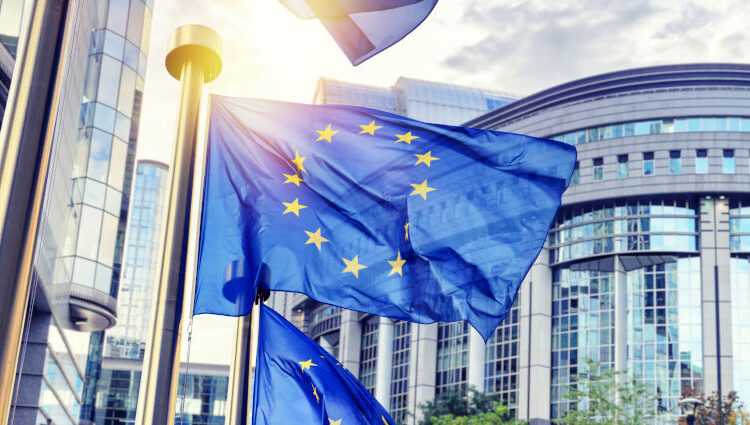European Union (EU) regulators have backed the Microsoft-Activision Blizzard acquisition, the European Commission revealed on Monday. If successful, the deal has set a precedent for Microsoft to become the largest gaming buyout in history.
The deal, valued at $69 billion USD, will allow the Redmond, Washington-based firm to buy the latter company. However, the deal initially raised red flags over reported anti-competitive practices.
Citing damage to the rising cloud gaming industry, the United Kingdom’s Competition and Markets Authority (CMA) blocked the acquisition in April. Due to the acquisition’s nature, European, British, and US regulators must approve the deal to move forward.
The significance of this deal marks how cloud gaming technologies can operate in the gaming industry. Microsoft initially aimed to cement the acquisition to build its serious gaming technologies for future metaverse technologies. Following the EU’s approval of the deal, Microsoft is a step closer to achieving its long-awaited goal.
European Commission’s Vestager Weighs In
According to Brussels, the EU Merger Regulation allows the Microsoft-Activision deal to proceed. Regulators stated that the approval is “conditional on full compliance with the commitments” Microsoft has offered.
Regulators stated that the commitments fully addressed anti-competition concerns from the Commission. Also, it represented “a significant improvement for cloud gaming as compared to the current situation.”
The Commission based its decision “on hard evidence” and “extensive information and feedback” from industry competitors, game developers, distributors, and cloud game streaming platforms across the EU.
With our 🇪🇺 clearance #Activition Blizzard’s games will also be available on cloud. This is good for competition and innovation and brings games to many more devices and consumers. #Microsoft‘s commitments will enable the streaming of games in any cloud game streaming service. https://t.co/DpcaRpiV7X
— Margrethe Vestager (@vestager) May 15, 2023
Despite initial concerns, the Commission’s investigation concluded Microsoft “would not be able to harm rival consoles and rival multi-game subscription services.” However, exclusive distributions on its Game Pass platform could potentially harm competition across markets, the organisation added.
The Commission proposed several comprehensive licensing commitments over a 10-year period, including free licences across the European Economic Area (EEA). Additionally, it cited Article 1 of the Merger Regulation to block anti-competitive mergers that would damage competition across the EEA.
Margrethe Vestaer, Executive Vice-President in Charge of Competition Policy, said that video games attracted “billions of users around the world” and it was “crucial to protect competition and innovation.”
She added:
“Our decision represents an important step in this direction, by bringing Activision’s popular games to many more devices and consumers than before thanks to cloud game streaming. The commitments offered by Microsoft will enable for the first time the streaming of such games in any cloud game streaming services, enhancing competition and opportunities for growth”
CMA Position on Activision Buyout
Despite the Commission’s approval, the CMA vetoed the acquisition, casting doubts on the success of the procedure. Microsoft and Activision have appealed the decision and hired a massive team of lawyers to fight the case.
Our response to the European Commission’s announcement today on Microsoft/Activision ⬇
[1/5]
— Competition & Markets Authority (@CMAgovUK) May 15, 2023
Microsoft originally launched its plans in January last year, with Satya Nadella, Company Chief Executive and Chairman, stating that the platform would play a significant “role in the development of Metaverse platforms.”
Recently, the CMA stated the merger could block competition by exclusively distributing titles on its cloud-based Game Pass platform. It added Microsoft could potentially undermine innovation in the cloud gaming market.
The announcement comes as numerous streaming services compete for the top titles across the market. Microsoft’s push to buy out Activision Blizzard aims to increase its competitive edge with Sony’s milestones in recent years. This is important as Sony recently opened sales for its PlayStation VR 2 (PSVR2) and its PS5 gaming console.
Charles Russell Speechlys Statement on EU Decision
In a press statement seen by XR Today, Gareth Mills, Partner at law firm Charles Russel Speechlys, said the EU regulator’s divergence from Britain’s decision on the Microsoft-Activision deal “may on the face of it seem surprising.”
However, he noted Brussel’s approval required that Microsoft agree to enter licensing deals with rivals. He noted the deal was contingent on “other behavioural remedies for future conduct providing regulatory safeguards.”
He added: “The picture is therefore more complex than a binary ‘approval/ rejection’ of the respective regulators that supporters of the deal may seek to imply.”
Concluding, Mills said,
“The saga is unlikely to come to an end anytime soon with a legal complaint refiled last week in the Californian courts by gamers seeking an injunction, as well as Microsoft’s heralded appeal of the CMA’s decision and the US Federal Trade Commission’s [FTC] case against the acquisition also still pending”
His statement indicates that Microsoft’s metaverse ambitions could potentially face more legal woes amid ongoing disputes with the FTC. The latter disagreement is set to kick off hearings later in the year.
FTC Lawsuit Against Microsoft-Activision Deal
The news comes after the FTC launched a lawsuit against Microsoft to block the acquisition. Despite this, courts could take extensive time to resolve the case.
The FTC said it had “authorized an administrative complaint” against the merger. Activision Blizzard develops and publishes hit titles like Call of Duty, Overwatch, World of Warcraft, and Diablo, among others.
The FTC said in a recent summary: “The agency alleges that the deal would enable Microsoft to suppress competitors to its Xbox gaming consoles and its rapidly growing subscription and cloud-gaming business.”
Courts will hear the case on 2 August of this year “before an Administrative Law Judge at the FTC’s headquarters,” it concluded. It is unclear if the measures have influenced the UK’s decision to block the acquisition.

